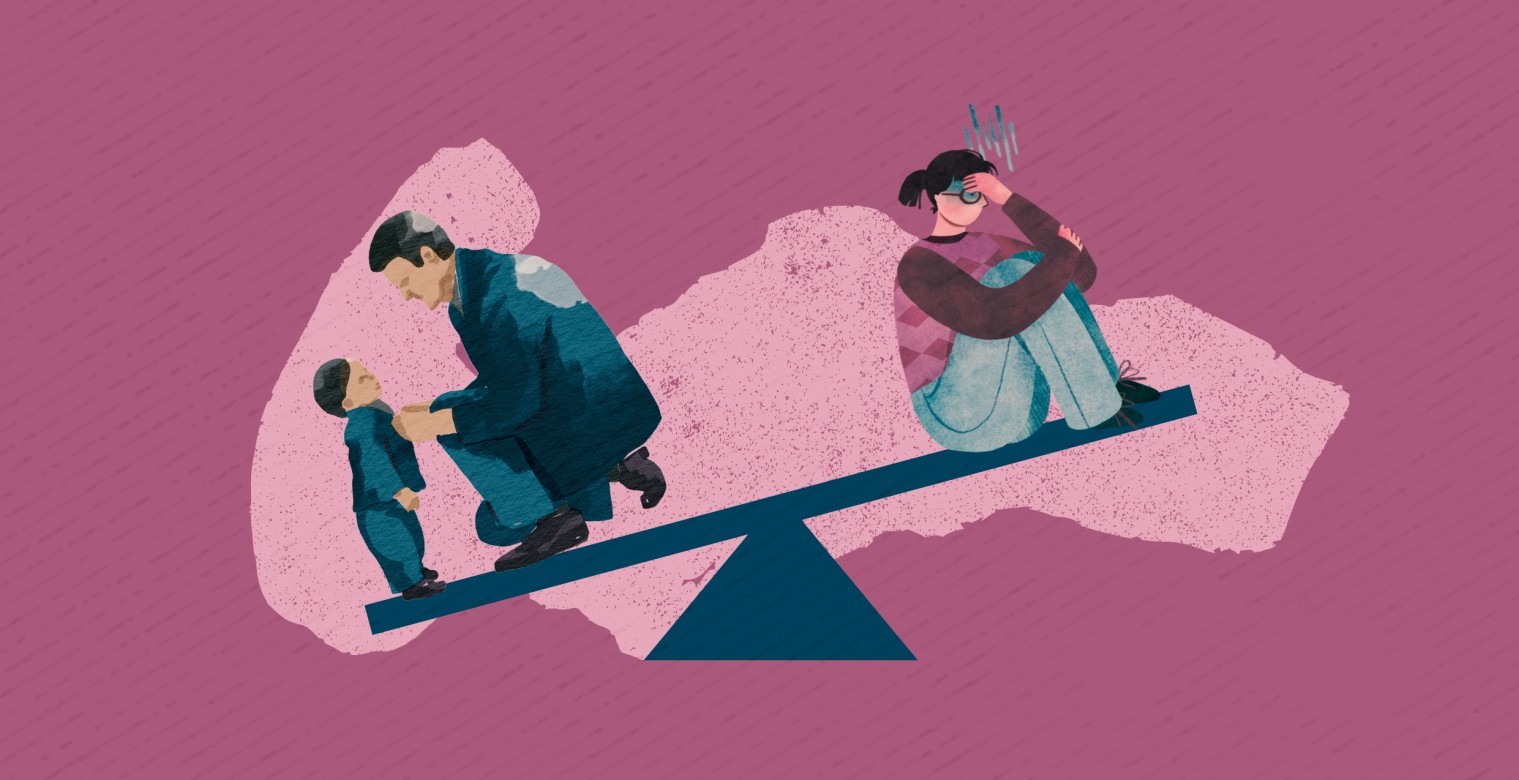Mervat Mohammed's (pseudonym) husband placed the insurmountable condition of waiving all her legitimate rights in exchange for divorce after he sent her to her father's house to end their marriage, while preferring to suspend her life, taking advantage of his right to guardianship and dismissing the wife, in order to avoid paying her financial dues incurred after the divorce.
In order for Mervat (29-year-old) to remain suspended, she must give up her legal right, which is estimated at 6,000 Jordanian dinars, the total of the delayed dowry, in addition to the "house furniture".
Despite experiencing continuous abuse from her husband, but Mervat did not prefer a divorce with the hope of providing her children Hanan (4 years old) and Raed (7 years old) with a stable family life. However, her husband decided to end this marital relationship by sending her to her family's house without officially and legally divorcing her.
In return for her husband's actions, Mervat refuses to give up her legal rights in exchange for divorce, telling "Last Story": "These rights were allocated by Sharia to women upon divorce in order to help them start a new life by opening a small business to support her, or completing her university studies, etc".
Mervat is one of dozens of women left hanging out as their husbands return them to their fathers' homes with the intention of separating but not divorcing them to evade the financial rights of divorce.
In this case, women live a harsh experience that may last for years in which they face deprivation of their rights, such as starting a new life or marrying another, without legal deterrence, as the law that enables women to file a lawsuit for separation for damage from discord and conflict against their husbands - a lawsuit that gives women the right to request a divorce before a Sharia judge even if the husband refuses to divorce - does not make them enjoy their full rights, according to the opinions of specialists.
According to Sheikh Omar Nofal, deputy president of the Court of Appeal, there have been about 480 separation cases heard by Sharia courts in the Gaza Strip this year.
Returning to Mervat, "last story" spoke with her husband, Yasser, a young man with a university degree and unemployed.
Her husbund justified the refusal to grant his wife a divorce to poor living and economic conditions in light of the high unemployment and poverty rate in the Gaza Strip and low opportunities to get a job, this makes it beyond his financial power to fulfill his wife's financial rights.
Yasser said: "My married life with Mervat is over, but I cannot give her a divorce before she waives her financial rights, because if I divorce her without that, she can ask me to pay a lot of money, and if I do not pay, she can imprison me whenever she wants, and this is what I try not to involve myself in."
Despite his choice to keep his wife hanging without divorcing her, Yasser did not hesitate to marry another woman and pay the full costs of the second marriage, which indicates that the deterioration of living conditions is a pretext for many husbands not to grant wives their rights after divorce.
In contrast to Mervat, Maram, (28 years old), who herself decided to return to her father's house, was demanding a divorce and leaving her husband of her own free will due to his addiction to narcotic pills and turning him into a predatory monster when looking for money, and sending him to prison three times.
Maram (pseudonym) told "Last Story", "My married life was an unbearable hell and I left it of my own volition and choice, while the husband refused to divorce and kept me suspended for two and a half years, until I filed a separation lawsuit, and if I had not done so, I would have remained suspended for a longer time."
According to social and psychological expert Zuhair Malakha, suspended women suffer from psychological trauma as they are living in a prison where their husbands hold the keys.
"The power and immunity that the husband enjoys in the matter of his guardianship over the wife may be abused by some to destroy the lives of their wives or to force them to give up their rights, and worse, this does not stop at the wife, but extends to the children, which means destroying the family due to the lack of a legal or societal framework to protect it," Malakha told "Last Story".
According to Article 132 of the 1976 Personal Status Law, a wife has the right to file for divorce through the Sharia courts, if it proves that the husband harmed her. According to the law, the judge must give the couple a month in the hope of reconciliation before ruling on the case.
However, what is happening in the corridors of the courts violates the provisions and criteria set by the law for considering cases of separation due to discord and dispute, according to Sharia lawyer Muhammad Abu Amra.
Abu Amra said: "There is a defect in the application of this law in the Sharia courts, as suspended women face the problem of prolonging the litigation for a period that may last to two years or more, due to the husbands' lawyers resorting to various tricks and pretexts before judges, to postpone the consideration of these cases and delay the pronouncement of the verdict."
Also, the judge does not order a woman to divorce unless she proves that she has suffered damage from her marital relationship, which husbands often face by denying and bringing false witnesses in exchange for money, to thwart the wife's claims, according to Abu Amra, as he explained that this eventually forces the wife to despair about the possibility of obtaining salvation, so she turns to the option of giving up her rights in exchange for a divorce.
"If a woman survives these false testimonies and is able to prove her right, the court does not grant her full legitimate rights as a divorcee because of her own initiative to divorce, in which case the judge estimates the amount of rights she will receive, which are usually half or less, so we see that the law does not do justice to women because it does not grant her her legitimate rights as divorcees," Abu Amra said.
The cases of separation in the Sharia courts in the Gaza Strip vary, as enumerated by the Vice President of the Sharia Court of Appeal, Sheikh Omar Nofal.
It is starting with separation for lack of spending, separation for immigration and suspension, in addition to separation for conflict and discord, as well as separation for absence and damage, and others.
While Nofal pointed out that the law of separation for harm from discord and conflict was designed to do justice to women and break the monopoly of men on the issue of divorce, contrary to the opinion of lawyer Abu Amra, the director of the Women's Affairs Center in Gaza, Amal Siam, said, "The Palestinian society is a masculine society by nature, and this means that the laws in force in cases of separation between spouses are more suited to the needs of males than females."
Siam believes that there are steps that must be taken to protect and guarantee women's outstanding rights, as she calls on the Sharia judiciary in Palestine to facilitate litigation procedures for women, speed up the decision of their cases, and allocate specialized courts to consider pending women's cases.
It also called on the Palestinian Legislative Council to enact laws commensurate with the needs of women, and not to keep them suspended for years until their lives are lost.
The "Last Story" went to the head of the legal committee in the Palestinian Legislative Council, Muhammad Faraj al-Ghoul, to learn about the role that parliament can play towards redress for women suspended, saying: "We are in the process of adopting the Sharia Procedure Law, which guarantees the rights of men and women before Sharia courts in the second reading after its adoption in the first reading previously."
Al-Ghoul said that the laws related to women before Sharia courts need constant development, but he considered them sufficient to guarantee women's rights. He also pointed out that the Legislative Council monitors the progress of these laws and works to develop them in accordance with Islamic law.





